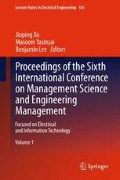Abstract
In this paper, we consider an autocorrelation of stock returns as a good proxy of degree of market inefficiency when we deal with the EMH in the weak sense. We check a time varying structure of autocorrelations of stock returns data based on the Moving Window method and estimate the time varying AR(1) coefficients by using a state space model. We use the monthly returns for the Shanghai A-share Index, B-Share index and S&P500 stock Index from 1992 to early 2012 as a sample. The result shows: the degree of market inefficiency varies through time; on the degree of market inefficiency, the Chinese stock market is greater than the U.S. stock market, A-share market is greater than the B-share market, and the market inefficiency between B-share market and the U.S. market has some linkage. Finally, we calculate the numerical measurement of relative market inefficiency on the Sino-U.S. Stock Markets.
Access this chapter
Tax calculation will be finalised at checkout
Purchases are for personal use only
Preview
Unable to display preview. Download preview PDF.
References
Samuelson P (1965) Proof that properly anticipated prices fluctuate randomly. Industrial Management Review 6:41–49
Campbell J, Lo A, MacKinlay A (1997) Econometrics of financial markets. Princeton University Press, New Jersey
Lo A (2004) The adaptive markets hypothesis: Market efficiency from an evolutionary perspective. Portfolio Manager Overview 30:15–29
Cajueiro D, Tabak B (2004) Evidence of long range dependence in asian equity markets: The role of liquidity and market restrictions. Physica A 342:656–677
Ma S (2004) The efficiency of China’s stock market. SSRN Working Paper, http://ssrn.com/
Yi RH, Da QL (2004) A measuring method of market efficiency and empirical research on market efficiency of chinese security market. China Soft Science 3:144–147
Lim K, Hinich M, Brooks R (2006) Events that shook the market: An insight from nonlinea serial dependencies in intraday returns. SSRN Working Paper, http://ssrn.com/
Evans T (2006) Efficiency tests of the UK financial futures markets and the impact of electronic trading systems. Applied Financial Economics 16:1273–1283
Lim K (2007) Ranking of efficiency for stock markets: A nonlinear perspective. Physica A 376:445–454
Giglio R, Matsushita R, Silva SD (2008) The relative efficiency of stock markets. Economics Bulletin 7:1–12
Ito M, Sugiyama S (2009) Measuring the degree of time varying market inefficiency. Economics Letters 103:62–64
Giglio R, Silva SD, Iram G et al (2010) Efficiency of financial markets and algorithmic complexity. Journal of Physics: Conference Series 246:12–32
Wang YD, Liu L, Gu R et al (2010) Analysis of market efficiency for the Shanghai stock market over time. Physica A 389:1635–1642
Shive S (2012) Local investors, price discovery, and market efficiency. Journal of Financial Economics 104:145–161
Jarrow R, Larsson M (2012) The meaning of market efficiency. Mathematical Finance 22:1–30
Acknowledgements
National Natural Science Foundation of China (NSFC) under project No. 70873115 and 71173203. The authors appreciate the support from National Natural Science Foundation of China (NSFC) under project No. 70873115 and 71173203. We are also thankful for the funding provided by Key Universities Research Institute of Humanities and Social Sciences in Zhejiang Province, China. Standardization and Intellectual Property Management.
Author information
Authors and Affiliations
Corresponding author
Editor information
Editors and Affiliations
Rights and permissions
Copyright information
© 2013 Springer-Verlag London
About this paper
Cite this paper
Yi, R., Zhang, Y. (2013). Comparative Study of Market Inefficiency on the Sino-U.S. Stock Markets. In: Xu, J., Yasinzai, M., Lev, B. (eds) Proceedings of the Sixth International Conference on Management Science and Engineering Management. Lecture Notes in Electrical Engineering, vol 185. Springer, London. https://doi.org/10.1007/978-1-4471-4600-1_19
Download citation
DOI: https://doi.org/10.1007/978-1-4471-4600-1_19
Published:
Publisher Name: Springer, London
Print ISBN: 978-1-4471-4599-8
Online ISBN: 978-1-4471-4600-1
eBook Packages: EngineeringEngineering (R0)

